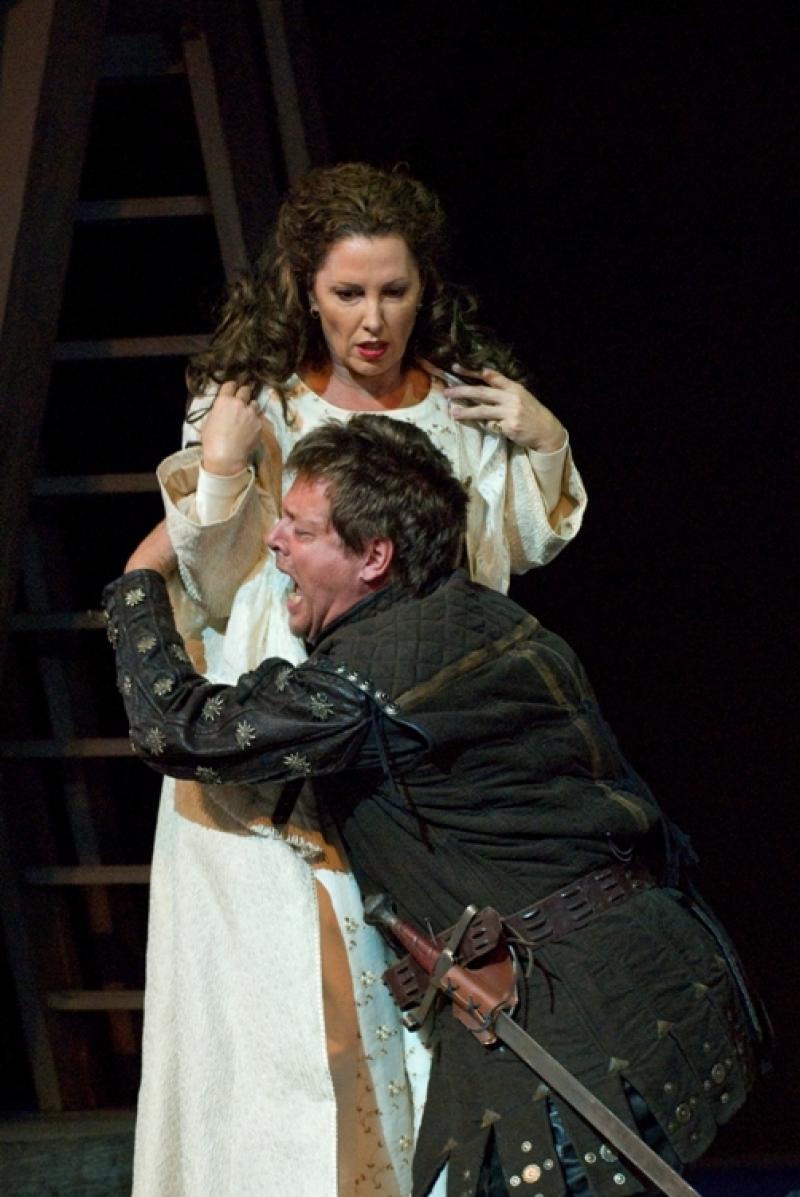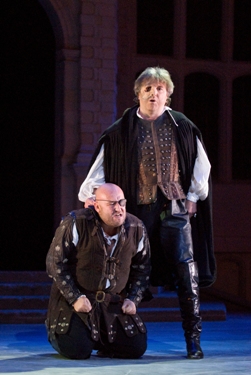Francesca da Rimini, Opera Holland Park | reviews, news & interviews
Francesca da Rimini, Opera Holland Park
Francesca da Rimini, Opera Holland Park
Hell is an opera by Zandonai in this thankless staging of a dinosaur

They're having a laugh at Holland Park, surely: offering 700 pay-what-you-like tickets to hook newcomers on the wonderful world of opera, and then serving up a Pythonesque staging of an immoveable Italian dinosaur.
They're having a laugh at Holland Park, surely: offering 700 pay-what-you-like tickets to hook newcomers on the wonderful world of opera, and then serving up a Pythonesque staging of an immoveable Italian dinosaur. Three fine singers wasted, a fourth prematurely past his prime: with these and less, director Martin Lloyd-Evans, the man who among many other things brought you Wallace and Gromit: Alive on Stage, apologetically presents Francesca da Rimini: Dead on Arrival.
Worse plots have had better scores, that's for sure
Clearly we're not talking the Francesca of Tchaikovsky's searing fantasy overture or even Rachmaninov's already over-extended one-act opera, both indebted to all too few lines in Dante's Inferno about the adulterous lovers of Rimini. One-trick pony Riccardo Zandonai fatally modelled his 1914 extravaganza on a flatulent drama by proto-Fascist Gabriele d'Annunzio.
The libretto, by publishing doyen Tito Ricordi, does nothing to pare down the purple poetry and in a second act battle between Guelphs and Ghibellines even more confusing than the background harum-scarums of Verdi's Simon Boccanegra, you might as well give up trying to understand who's doing what to whom. All this is further compounded by the mayhem of Lloyd-Evans's production, when lovers Francesca and Paolo (the usually stalwart Cheryl Barker and Julian Gavin) try their best to hold the attention on a rickety wooden battlement while chorus members do daft things with bows. Some of us shook with suppressed mirth when we weren't rigid with embarrassment.
So: the music - worth enduring the halting action for? Worse plots have had better scores, that's for sure. You think Zandonai's going to serve up a feast of imaginative orchestration as conductor Phillip Thomas plunges us into trumpet tuckets and vivid colour at the start of Act One. But already Lloyd-Evans is sucking what intermittent vitality there is by having the chorus members stand like blocks of wood on stage - why? - while minor characters try to go about their sparring business. What he's begun, Zandonai quickly finishes off. Later, at least, there's a good build up of excitement from Francesca's bubbly quartet of serving women before the scene of love at first sight between Francesca and Paolo, brother of her bridegroom-to-be. It unfolds to a long, sensuous cello solo - a more exotic five-stringed antique instrument in the original - but again, our director flattens any possible glamour by having Gavin prosaically appear with his clumping entourage between the two shunted walls. What could at least look like a Straussian Presentation of the Rose goes for nothing.
 Can this be the same tenor who gave us such a sexy, real Cavaradossi in Catherine Malfitano's quietly brilliant English National Opera production of Tosca? Can, for that matter, Barker be the same soprano who scoured our souls as Puccini's Suor Angelica or Strauss's Salome? For a start, physically they get no help from the director; but musically, too, even their later love scenes are all foreplay and no luscious climax, though they sing out lustrously when they can. Zandonai seems to have scotched the big numbers of a more healthily vulgar Italian operatic style in favour of the through-composed music-drama of his age. But he was no Strauss or Puccini, and his Francesca is neither fish nor fowl.
Can this be the same tenor who gave us such a sexy, real Cavaradossi in Catherine Malfitano's quietly brilliant English National Opera production of Tosca? Can, for that matter, Barker be the same soprano who scoured our souls as Puccini's Suor Angelica or Strauss's Salome? For a start, physically they get no help from the director; but musically, too, even their later love scenes are all foreplay and no luscious climax, though they sing out lustrously when they can. Zandonai seems to have scotched the big numbers of a more healthily vulgar Italian operatic style in favour of the through-composed music-drama of his age. But he was no Strauss or Puccini, and his Francesca is neither fish nor fowl.
The lovers' dark counterparts are the lame and one-eyed Malatestas (pictured above), Francesca's husband and brother-in-law, nothing more than melodramatic stereotypes of deformity. Jeffrey Lloyd Roberts's edgy intensity is wasted on Malatestino, and Jeffrey Black's Gianciotto has a vibrato a mile wide (time was when he served as the dashing baritone of choice). But you doubt if anyone could do much with Zandonai's tiresome exploitation of that "devil in music" the tritone or the tediously repetitive jazzy syncopated figure that has to bear the weight of malcontent Malatestino.
Francesca's four serving women fare better with several pretty Pre-Raphaelitish interludes. Each of the singers - Madeleine Shaw, Emma Carrington, Anna Leese and Gail Pearson - deserves equal praise for coaxing the diversions to life, and Thomas draws rather beautiful colours from the City of London Sinfonia both here and in the introduction to Paolo's and Francesca's fatal reading of an old romance. But Thomas, excellent in the cut and thrust of Verdi's Ernani at ENO and able if anyone can to bring out the best in his singers as a vocal coach second to none, has little chance to develop a line. The abrupt double murder which ends the opera is as inept musically as most of the rest. If only Zandonai and d'Annunzio, like Dante, had consigned the lovers to hell, there might have been a better epilogue. But then you came to realise that this evening was indeed hell, and we were in it.
Add comment
The future of Arts Journalism
You can stop theartsdesk.com closing!
We urgently need financing to survive. Our fundraising drive has thus far raised £49,000 but we need to reach £100,000 or we will be forced to close. Please contribute here: https://gofund.me/c3f6033d
And if you can forward this information to anyone who might assist, we’d be grateful.

Subscribe to theartsdesk.com
Thank you for continuing to read our work on theartsdesk.com. For unlimited access to every article in its entirety, including our archive of more than 15,000 pieces, we're asking for £5 per month or £40 per year. We feel it's a very good deal, and hope you do too.
To take a subscription now simply click here.
And if you're looking for that extra gift for a friend or family member, why not treat them to a theartsdesk.com gift subscription?
more Opera
 Orpheus and Eurydice, Opera Queensland/SCO, Edinburgh International Festival 2025 review - dazzling, but distracting
Eye-popping acrobatics don’t always assist in Gluck’s quest for operatic truth
Orpheus and Eurydice, Opera Queensland/SCO, Edinburgh International Festival 2025 review - dazzling, but distracting
Eye-popping acrobatics don’t always assist in Gluck’s quest for operatic truth
 MARS, Irish National Opera review - silly space oddity with fun stretches
Cast, orchestra and production give Jennifer Walshe’s bold collage their all
MARS, Irish National Opera review - silly space oddity with fun stretches
Cast, orchestra and production give Jennifer Walshe’s bold collage their all
 Káťa Kabanová, Glyndebourne review - emotional concentration in a salle modulable
Janáček superbly done through or in spite of the symbolism
Káťa Kabanová, Glyndebourne review - emotional concentration in a salle modulable
Janáček superbly done through or in spite of the symbolism
 Buxton International Festival 2025 review - a lavish offering of smaller-scale work
Allison Cook stands out in a fascinating integrated double bill of Bernstein and Poulenc
Buxton International Festival 2025 review - a lavish offering of smaller-scale work
Allison Cook stands out in a fascinating integrated double bill of Bernstein and Poulenc
 Tosca, Clonter Opera review - beauty and integrity in miniature
Happy surprises and a convincing interpretation of Puccini for today
Tosca, Clonter Opera review - beauty and integrity in miniature
Happy surprises and a convincing interpretation of Puccini for today
 Hamlet, Buxton International Festival review - how to re-imagine re-imagined Shakespeare
Music comes first in very 19th century, very Romantic, very French operatic creation
Hamlet, Buxton International Festival review - how to re-imagine re-imagined Shakespeare
Music comes first in very 19th century, very Romantic, very French operatic creation
 Falstaff, Glyndebourne review - knockabout and nostalgia in postwar Windsor
A fat knight to remember, and snappy stagecraft, overcome some tedious waits
Falstaff, Glyndebourne review - knockabout and nostalgia in postwar Windsor
A fat knight to remember, and snappy stagecraft, overcome some tedious waits
 Salome, LSO, Pappano, Barbican review - a partnership in a million
Asmik Grigorian is vocal perfection in league with a great conductor and orchestra
Salome, LSO, Pappano, Barbican review - a partnership in a million
Asmik Grigorian is vocal perfection in league with a great conductor and orchestra
 Semele, Royal Opera review - unholy smoke
Style comes and goes in a justifiably dark treatment of Handelian myth
Semele, Royal Opera review - unholy smoke
Style comes and goes in a justifiably dark treatment of Handelian myth
 Le nozze di Figaro, Glyndebourne review - perceptive humanity in period setting
Mostly glorious cast, sharp ideas, fussy conducting
Le nozze di Figaro, Glyndebourne review - perceptive humanity in period setting
Mostly glorious cast, sharp ideas, fussy conducting
 Fidelio, Garsington Opera review - a battle of sunshine and shadows
Intimacy yields to spectacle as Beethoven's light of freedom triumphs
Fidelio, Garsington Opera review - a battle of sunshine and shadows
Intimacy yields to spectacle as Beethoven's light of freedom triumphs
 Dangerous Matter, RNCM, Manchester review - opera meets science in an 18th century tale
Big doses of history and didaction are injected into 50 minutes of music theatre
Dangerous Matter, RNCM, Manchester review - opera meets science in an 18th century tale
Big doses of history and didaction are injected into 50 minutes of music theatre

Comments
...
...
...
...
...
...
...
...
...
...
...
...
...
...
...
...
...
...
...
...
...
...
...
...
...
...
...
...
...